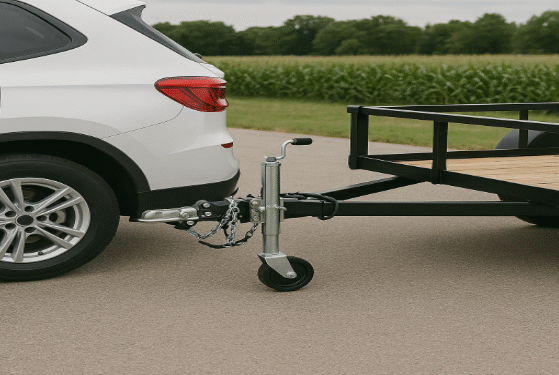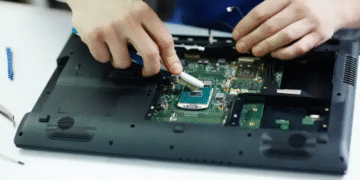Towing a trailer may look as easy as plugging in and going, but it’s far more complicated. Whether you’re towing an RV for a quick weekend trip or hauling a utility trailer for work, neglecting the finer points can create hazardous conditions.
Steering clear of typical towing errors isn’t just about safeguarding your load; it’s about keeping everyone on the road safe. From adequate hitch support to good driving behaviour, towing means preparation, diligence, and proper equipment. A safety-first attitude can help you avoid accidents, tickets, or expensive damage to your rig.
Let us discuss more in-depth the mistakes most drivers commit and how to stay ahead of the crowd by being safety-oriented.
1. Overlooking Hitch Compatibility
One of the most significant errors in towing is failing to check the hitch’s compatibility. Most drivers think any hitch will do for their trailer and only discover too late that it will not fit or does not have the correct weight capacity.
Your hitch support system should be suitable for your car and trailer specifications. It needs to possess the correct class of hitch that sustains the weight of your cargo. If it’s not rated correctly, your hitch will either bend, break, or even collapse under pressure. This is a recipe for disaster when driving.
Brief Tip:
Always check the Gross Trailer Weight (GTW) and Tongue Weight (TW) capacity of your trailer and hitch before driving.
2. Omitting the Pre-Tow Inspection
As you wouldn’t pilot a plane without a checklist, risk-free towing requires a complete inspection each time. However, the average driver leaves this step out due to habit or expediency.
Below is a quick inspection checklist:
- Tires: Inspect tire pressure and tread on trailer and tow vehicle.
- Lights: Ensure that the turn, brake, and taillights work.
- Chains: Position them below the hitch as a backup support system.
- Brakes: Inspect your trailer brake controller.
Secure your load and distribute it evenly. Minor issues, like loose couplers or under-inflated tires, can quickly become major ones. Even if you towed the same rig yesterday, don’t skip the inspection.
3. Uneven weight distribution
The most frequent reason for trailer sway is improper weight distribution. If you have excess weight towards the back of your trailer, your front end will be light and unbalanced. Too much weight in the hitch will stress your truck’s suspension system and affect the steering.
A weight distribution hitch is handy in most cases, especially when you have heavier trailers. It distributes weight more evenly to all your tow vehicle’s axles for enhanced handling and safety.
Don’t hesitate to consult a trailer hitch specialist if you’re not certain whether your configuration requires one.
4. Neglect to Account for Extra Length and Weight
Towing changes your car’s handling. It stops sooner, corners more radically, and is more problematic to be overtaken. The most common two accidents happen because you underestimate the space needed.
- Practice defensive driving skills.
- Increase the following distance.
- Slow down when nearing turns and curves.
- Don’t change lanes unexpectedly.
- Check mirrors frequently to keep tabs on trailing weave or traffic.
It does take time to get used to the size of your trailer. Do a couple of practice runs before driving on the highway, especially if you’re a first-time driver.
5. Using the Wrong Tow Accessories
The strength of a towing system depends on its weakest part. This includes the ball mount, the hitch pin, the sway control system, and the safety chains. Substandard or mismatched accessories will cause instability even when the hitch is rated correctly.
Invest in quality, heavy-duty towing equipment. It costs a little more up front, but it will pay for itself in terms of peace of mind and on-road performance. If you’re not sure that you’re putting the right thing together for a specific application, consult the supplier’s customer service. They’re your best guide.
6. Disregard for State Towing Laws
Towing statutes lack consistency in all states. They range from requiring breakaway brakes to safety lights or mirrors. Often, drivers unknowingly break these rules and are fined or create hazardous conditions.
Prior to a cross-state trip, spend a few minutes studying towing legislation applicable to all the states along your planned route. It’s one of the towing questions that people tend to forget to ask when it’s already too late.
7. Failing to Educate Yourself
Towing isn’t plug-and-play. There are physics and safety protocols, and specialized gear. One of the best things you can do is learn from experienced towers and industry experts. Read owner’s manuals, watch how-to clips, or ask questions on towing forums.
Most two problems result from fundamental knowledge gaps. Everything from tongue weight to backing up a tow vehicle must be taught to avoid inexperienced missteps becoming huge hazards on the road.
8. Not asking for assistance when you need it
There should be no shame in asking for assistance, especially when safety comes into play. If you’re not sure about the stability of your trailer or notice vibration in the hitch location, you should ask for help. Professional installers and manufacturers usually have good support for towing problems. Most firms do their best to provide you with a problem-free and secure ride. Don’t guess when it comes to your tow arrangement. Leave it to a professional and have the alterations made before towing.
Drive Smart, Too Safe
Towing isn’t necessarily tough, but it does require respect. Each detail that’s forgotten—everything from the hitch’s strength to the mirrors’ position—increases danger. By not making these mistakes and by being safety-conscious, you’re safeguarding your vehicle, your load, and everyone else on the road.
If you are looking for guaranteed ways to make towing easy, a quick look at state-of-the-art hitch support systems, including those made by manufacturers like Andersen Hitches, can be a lifesaver. It always pays to spend money on equipment made with safety and performance in mind.
Want to tow more confidently? Start by asking the right questions about towing, purchasing the right gear, and never losing the little things. Safe towing starts with knowing the basics—and keeping your wits about you.










